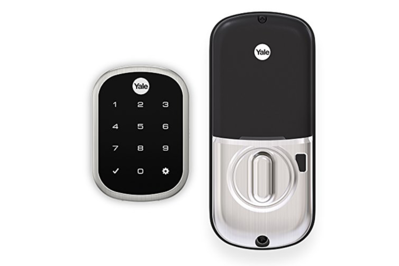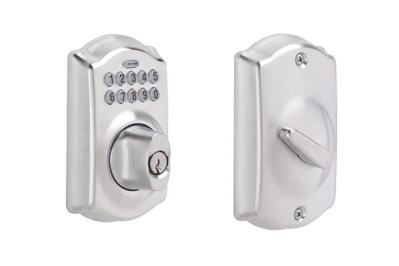When you think about it, keys are irritating—they’re bulky, you’ve got to keep track of them, and your keychain just picks up more and more of them as time goes by. A convenient alternative is an electronic lock: In the middle ground between traditional keyed locks and fully connected smart locks, these keyless locks open with a code entered on a touchscreen or a keypad. Their ability to add or delete multiple user codes comes close to a smart lock’s versatility, but using these doesn’t require any kind of connected device. We tested six electronic locks, and the Yale YRD256 Assure Lock SL offers the best combination of security, features, and overall looks.
Our pick
Yale YRD256 Assure Lock SL
The Yale has a sleek interface and easy programming, and is more customizable than the others we looked at.
Buying Options
*At the time of publishing, the price was $127.
The Yale YRD256 Assure Lock SL has an excellent interface that makes it simple to use, program, and adjust feature settings. The touchscreen buttons are easy to press, even with bulky gloves on. The lock offers a wide array of customizations that others don’t have, such as volume control, language options, and a feature that automatically locks the door behind you. It can hold up to 25 unique codes and has the second-highest ANSI security rating. The Yale was also the most attractive among those we tested, taking up the smallest footprint and having the lowest profile. It is not a smart lock so it can’t be controlled through a phone or device, but unlike the others, it can be retrofitted with a smart module at a later date, giving it full connectivity.
Runner-up
Schlage BE365 Keypad Deadbolt
The Schlage has the highest security rating, but it’s not as automated as the others. It still needs a manual turn to retract the bolt.
Buying Options
*At the time of publishing, the price was $100.
If the Yale is not available, or if you prefer the hands-on feel of turning the deadbolt yourself, we like the Schlage BE365 Keypad Deadbolt. The deadbolt on the Schlage doesn’t automatically retract like it does on the Yale, so once the code is entered, it still needs to be turned and unlocked manually. The Schlage has a higher security grade than the Yale, but it lacks a few features (like language options) and is also a little fussier to program.






